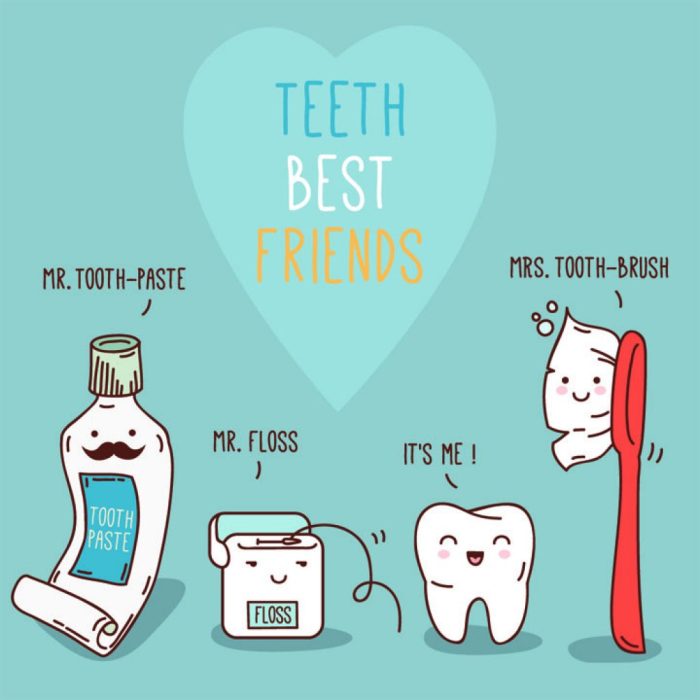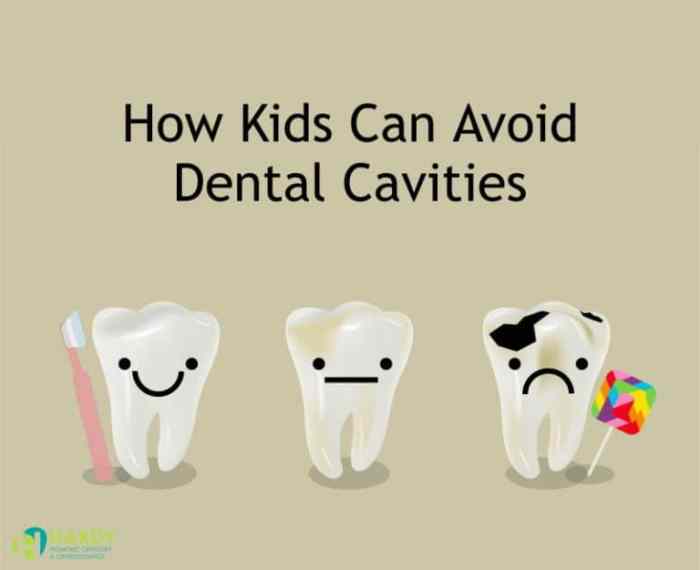
How to prevent cavities with proper dental care begins with understanding the importance of oral hygiene and regular dental check-ups. By implementing healthy dietary habits and effective oral hygiene practices, you can maintain optimal oral health and keep cavities at bay.
Importance of Dental Care for Preventing Cavities: How To Prevent Cavities With Proper Dental Care

Proper dental care plays a crucial role in preventing cavities and maintaining good oral health. Cavities, also known as tooth decay, can lead to pain, infections, and other serious oral health issues if left untreated. By implementing regular dental care practices, individuals can significantly reduce their risk of developing cavities and ensure the longevity of their teeth.
Impact of Cavities on Oral Health
Cavities can have a detrimental impact on oral health, affecting not only the affected tooth but also adjacent teeth and gums. If cavities are left untreated, they can progress and lead to complications such as abscesses, gum disease, and even tooth loss.
In severe cases, cavities can result in significant pain and discomfort, impacting an individual’s overall quality of life.
Common Dental Care Practices to Prevent Cavities
- Brushing twice a day: Regular brushing helps remove plaque and bacteria from the teeth, preventing the formation of cavities.
- Flossing daily: Flossing helps clean between teeth and along the gumline, where toothbrushes may not reach effectively.
- Regular dental check-ups: Visiting the dentist for routine check-ups and cleanings can help identify and treat cavities early on.
- Limiting sugary foods and drinks: Consuming excessive sugary items can contribute to cavity formation, so it’s important to maintain a balanced diet.
- Fluoride treatments: Fluoride can strengthen tooth enamel and help prevent cavities. Dentists may recommend fluoride treatments or toothpaste for added protection.
Proper Oral Hygiene Practices
Maintaining proper oral hygiene is crucial in preventing cavities and maintaining overall oral health. By following effective oral hygiene practices, you can significantly reduce the risk of developing cavities and other dental issues.
Types of Toothbrushes and Effectiveness
- Soft-bristled Toothbrush: Recommended by dentists as it is gentle on the gums and enamel while effectively removing plaque and food particles.
- Electric Toothbrush: Can be more efficient in cleaning hard-to-reach areas and providing a consistent brushing technique.
- Manual Toothbrush: Requires proper technique and diligence in brushing to ensure all surfaces are cleaned thoroughly.
It is essential to replace your toothbrush every three to four months or sooner if the bristles become frayed.
Tips for Proper Brushing and Flossing
- Brush at least twice a day using fluoride toothpaste to strengthen enamel and prevent decay.
- Hold your toothbrush at a 45-degree angle and use gentle, circular motions to clean all surfaces of your teeth.
- Don’t forget to brush your tongue to remove bacteria and freshen your breath.
- Floss daily to clean between teeth and remove plaque that can lead to cavities.
- Consider using mouthwash to rinse away bacteria and protect against cavities.
Importance of Regular Dental Check-ups
Regular dental check-ups play a crucial role in preventing cavities and maintaining optimal oral health. These routine visits to the dentist are essential for early detection of dental issues, which can help prevent the development of cavities.
Early Detection for Prevention
Regular dental check-ups allow dentists to identify any potential dental problems at an early stage. By catching issues such as tooth decay, gum disease, or enamel erosion early on, preventive measures can be taken to avoid the formation of cavities.
Early detection also helps in addressing any underlying oral health concerns before they escalate into more serious problems.
Recommended Frequency of Dental Visits
It is generally recommended to visit the dentist for a check-up at least twice a year. However, the frequency of dental visits may vary depending on individual oral health needs. Some individuals with specific risk factors for cavities or other dental issues may benefit from more frequent visits as recommended by their dentist.
Regular dental check-ups, combined with proper oral hygiene practices, are key to preventing cavities and maintaining a healthy smile.
Healthy Dietary Habits for Cavity Prevention

Proper nutrition plays a crucial role in maintaining good oral health and preventing cavities. By making smart choices in your diet, you can promote healthy teeth and gums while reducing the risk of dental issues.
Foods and Beverages to Avoid for Cavity Prevention
Sugary and acidic foods and beverages are major contributors to cavity formation.
- Sodas and sugary drinks: The high sugar content in these beverages can lead to tooth decay.
- Candies and sweets: Sticky and chewy candies can get stuck in the crevices of your teeth, promoting cavity formation.
- Processed snacks: Chips, crackers, and other processed snacks often contain added sugars and starches that can harm your teeth.
- Acidic foods: Citrus fruits and juices, as well as vinegar-based dressings, can erode tooth enamel over time.
Dietary Recommendations for Healthy Teeth, How to prevent cavities with proper dental care
Eating a balanced diet rich in essential nutrients can help strengthen your teeth and prevent cavities.
- Calcium-rich foods: Dairy products, leafy greens, and almonds are excellent sources of calcium, which is essential for strong teeth.
- Fruits and vegetables: Crunchy fruits and vegetables like apples and carrots can help clean your teeth and stimulate saliva production, which helps neutralize acids in the mouth.
- Water: Drinking water throughout the day helps rinse away food particles and bacteria that can lead to cavities.
- Sugar-free gum: Chewing sugar-free gum after meals can help increase saliva flow and reduce the risk of cavities.
Closing Summary
In conclusion, prioritizing proper dental care through consistent oral hygiene practices, regular dental check-ups, and a healthy diet can significantly reduce the risk of developing cavities and ensure a healthy smile for years to come.
Clarifying Questions
What role does proper dental care play in preventing cavities?
Proper dental care helps remove plaque and bacteria that can lead to cavity formation, maintaining good oral health.
How often should I visit the dentist to prevent cavities?
It is recommended to visit the dentist every six months for regular check-ups to prevent cavities and address any oral health issues early on.
What foods should I avoid to prevent cavities?
Avoid sugary snacks and beverages, as well as acidic foods that can erode tooth enamel and contribute to cavity formation.





